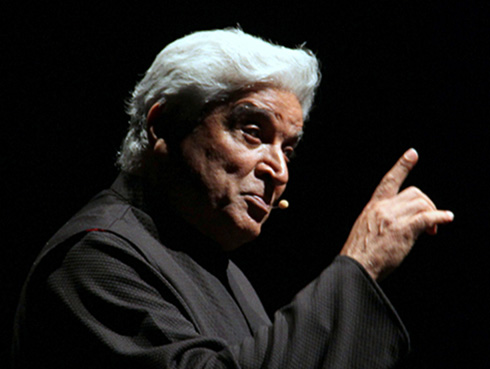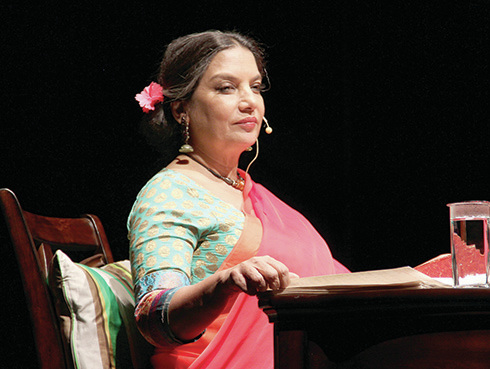
BY RITU CHUGH
LONG BEACH, CA - Shabana Azmi and Javed Akhtar poured their hearts into a two-hour theatrical experience called ‘Kaifi Aur Main.’It is an intense poetry recitation with humor, romance and anguish interwoven with gazals and the sounds of melancholic music. It pushes you into dark places and pulls you right out into love and...
LONG BEACH, CA - Shabana Azmi and Javed Akhtar poured their hearts into a two-hour theatrical experience called ‘Kaifi Aur Main.’It is an intense poetry recitation with humor, romance and anguish interwoven with gazals and the sounds of melancholic music. It pushes you into dark places and pulls you right out into love and...
light. The experiential drama had 2000 people steadfast in their seats at the Terrace Theater here on April 10, in the heart of the Southland, equidistance from the Valley and Orange County. Theater lovers gathered, some with a limited understanding of Urdu and others fluent in it, to enjoy the ‘Andaaz’ and ‘Ehsaas’ of shayari and poetry that could only be so well done in Udru.
A daughter and son-in-law epidermis their passionately progressive and paralyzed poetic father on his tenth death anniversary. He, who brought Urdu literature into Hindi cinema and was born Sayyid Akhtar Hussein Rizvi is known to us as Kaifi Azmi.
‘Kaifi aur Main’ is set amid the backdrop of pre-independent India where a coy romance bloomed between Shabana’s parents Shaukat and Kaifi. The show is a collage of excerpts from her book, ‘Yaad ki Rehguzaar’ and various interviews, poetry and memoirs from his life. It is the love and life story of a couple living though the independence struggle. It is the story of the sword and the pen intermingling with a revolution and a resolve to love and be free, the story of a 55-year journey of progression and passion through poetry. The moving moment for Shaukat in the 1940s and for the audience, was with the iteration of Kaifi’s poem ‘Aurat,’ - “Jannat ek aur hai jo mard ke pehlu mein nahi, uske aazad ravish par hi machalna hai tujhe, uth meri jaan, mere saath hi chaalna hai tujhe.” These words amplified Kaifi’s progressive social ideas and his romantic being at mehfils.
Lovers of shayari and gazaals were both content with the evening’s performance as Jaswinder Singh enthralled the audience with movie songs by Kaifi. ‘Tum jo mil gaye ho’ (Haste Zakham) sealed expression of his love for Shaukat. ‘Ab tumare Hawale watan sathiyo’(Haqeeqat) bid his final goodbye. ‘Tum itna jo muskura rahe ho’ (Arth), brought forth his resolve after his paralysis attack. Each song fittingly wove itself into a narration of the story of their life.
A brooding black and red backdrop sketch of Kaifi stared at the audience the whole two hours. It added mystery and ambiguity to the setting. In its shadow Shabana most effortlessly enacted the saga from her mother’s perspective. The inner most feelings of a mother were depicted with simplicity and brilliance by a daughter and a fine artist. From the giggles and coy smiles towards Kaifi during courtship to the emotionally charged moments of his being paralyzed and finally passing away, she engaged the audiences and brought smiles and tears as only an artist of her caliber can.
Akhtar kept the audience interested with his witty rendition of Kaifi, his charged voice and romantic tones transported many to the time in history he referred to. One could feel the passion of Kaifi in the blood-written letter to his love, his urge to be jailed in his fight for independence, the thirst in his voice when after three glasses of water he says to his beloved, “Piyaas nahi bujhi”.
Kaifi Azmi’s communist leanings and ideology were woven well into the script. His big break came in 1959 with Guru Dutt’s ‘Kaagaz Ke Phool’ with S.D. Burman as music director. He wrote that the business of writing songs in films was strange because very often the tune would be composed first and then words would be fitted in. Akhtar humorously reiterated his words that this is like first digging a grave and then finding a corpse to fit into it. So sometimes the head would stick out and sometimes the feet – but with me the directors were satisfied that I could bury corpses competently. His crowning glory was `Heer Ranjha’in which Kaifi not only wrote the songs, he also wrote the entire script in verse and created an all time record.
On Feb 8, 1972 Kaifi suffered a brain hemorrhage which incapacitated his left leg and left hand for life. After going through bouts of depression, Kaifi pulled himself together and dedicated himself to uplift Mijwan, the tiny village in Azamgarh, his birth place.
Ramesh Talwar’s well put together ‘Kaifi Aur Main’ as a rendition of memoirs and poetry that described the times and the love of two individuals. It however is a bit of an embarrassing affair, an overdone felicitation where invariably the right things are said about the person being felicitated. A balanced portrayal of the negatives and positives, in a creative manner would add a touch of missing realness. The show received a standing ovation as Jaswinder Singh introduced the musicians and organizers of Stagepaint Productions, Manoj Kaytee and Anil Shah.
A daughter and son-in-law epidermis their passionately progressive and paralyzed poetic father on his tenth death anniversary. He, who brought Urdu literature into Hindi cinema and was born Sayyid Akhtar Hussein Rizvi is known to us as Kaifi Azmi.
‘Kaifi aur Main’ is set amid the backdrop of pre-independent India where a coy romance bloomed between Shabana’s parents Shaukat and Kaifi. The show is a collage of excerpts from her book, ‘Yaad ki Rehguzaar’ and various interviews, poetry and memoirs from his life. It is the love and life story of a couple living though the independence struggle. It is the story of the sword and the pen intermingling with a revolution and a resolve to love and be free, the story of a 55-year journey of progression and passion through poetry. The moving moment for Shaukat in the 1940s and for the audience, was with the iteration of Kaifi’s poem ‘Aurat,’ - “Jannat ek aur hai jo mard ke pehlu mein nahi, uske aazad ravish par hi machalna hai tujhe, uth meri jaan, mere saath hi chaalna hai tujhe.” These words amplified Kaifi’s progressive social ideas and his romantic being at mehfils.
Lovers of shayari and gazaals were both content with the evening’s performance as Jaswinder Singh enthralled the audience with movie songs by Kaifi. ‘Tum jo mil gaye ho’ (Haste Zakham) sealed expression of his love for Shaukat. ‘Ab tumare Hawale watan sathiyo’(Haqeeqat) bid his final goodbye. ‘Tum itna jo muskura rahe ho’ (Arth), brought forth his resolve after his paralysis attack. Each song fittingly wove itself into a narration of the story of their life.
A brooding black and red backdrop sketch of Kaifi stared at the audience the whole two hours. It added mystery and ambiguity to the setting. In its shadow Shabana most effortlessly enacted the saga from her mother’s perspective. The inner most feelings of a mother were depicted with simplicity and brilliance by a daughter and a fine artist. From the giggles and coy smiles towards Kaifi during courtship to the emotionally charged moments of his being paralyzed and finally passing away, she engaged the audiences and brought smiles and tears as only an artist of her caliber can.
Akhtar kept the audience interested with his witty rendition of Kaifi, his charged voice and romantic tones transported many to the time in history he referred to. One could feel the passion of Kaifi in the blood-written letter to his love, his urge to be jailed in his fight for independence, the thirst in his voice when after three glasses of water he says to his beloved, “Piyaas nahi bujhi”.
Kaifi Azmi’s communist leanings and ideology were woven well into the script. His big break came in 1959 with Guru Dutt’s ‘Kaagaz Ke Phool’ with S.D. Burman as music director. He wrote that the business of writing songs in films was strange because very often the tune would be composed first and then words would be fitted in. Akhtar humorously reiterated his words that this is like first digging a grave and then finding a corpse to fit into it. So sometimes the head would stick out and sometimes the feet – but with me the directors were satisfied that I could bury corpses competently. His crowning glory was `Heer Ranjha’in which Kaifi not only wrote the songs, he also wrote the entire script in verse and created an all time record.
On Feb 8, 1972 Kaifi suffered a brain hemorrhage which incapacitated his left leg and left hand for life. After going through bouts of depression, Kaifi pulled himself together and dedicated himself to uplift Mijwan, the tiny village in Azamgarh, his birth place.
Ramesh Talwar’s well put together ‘Kaifi Aur Main’ as a rendition of memoirs and poetry that described the times and the love of two individuals. It however is a bit of an embarrassing affair, an overdone felicitation where invariably the right things are said about the person being felicitated. A balanced portrayal of the negatives and positives, in a creative manner would add a touch of missing realness. The show received a standing ovation as Jaswinder Singh introduced the musicians and organizers of Stagepaint Productions, Manoj Kaytee and Anil Shah.




 RSS Feed
RSS Feed
